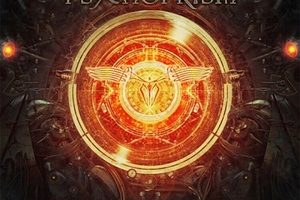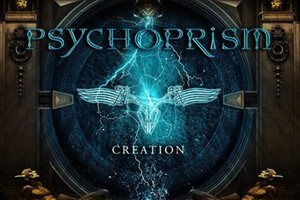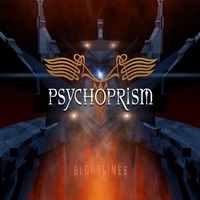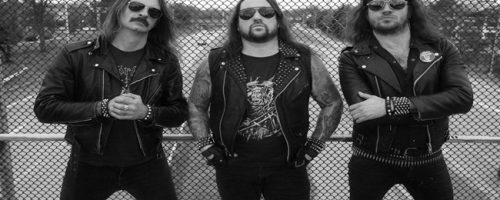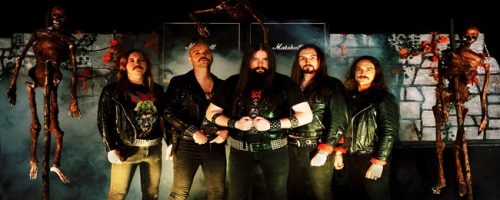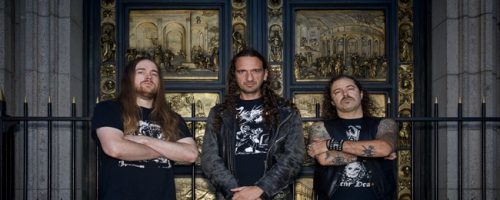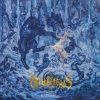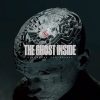Psychoprism – Letting Opportunity Knock
Thursday, 13th January 2022
Five years after their debut album Creation, Psychoprism returns with another stellar neoclassical-fueled power/progressive metal offering for R.I.S.E. (short for Resistance in Systematic Evolution). Expect multi-octave vocal melodies, stellar guitar/keyboard riffs, neoclassical shred-oriented lead breaks, and rhythm section support that keeps their sound sharp and on point. This is US metal with high octane musicianship and performances to study, absorb, and treasure. We reached out to vocalist Jess Rittgers and guitarist Bill Vesser to catch up on everything surrounding the new album, including upgrades in recording and personal gear, thoughts on the cover art, differences between the support overseas and stateside, plus interesting talk about everything from Warrant to Duran Duran beyond the normal metal discussion.
Dead Rhetoric: R.I.S.E. is the second full-length from Psychoprism – five years after your Creation debut in 2016 on Pure Steel Records. How did the composing and recording process go for this effort? Where do you see the major differences in this record compared to your debut – and were there any surprises, obstacles, or difficulties to work through?
Jess Rittgers: Let’s take it back to the beginning. We did Creation, and there were some computer glitches that we had where some stuff wasn’t working, lagging, and there needed to be upgrades. So Bill upgraded a bunch of stuff, and we didn’t have those problems. We are now looking forward to having a new set of problems – or at least not the same set of problems. Primarily, first of all we had one album under our belt.
Bill Vesser: I think it was inexperience on Creation. That’s what caused a lot of problems, the inexperience when you are doing things yourselves. I think that was the majority of it.
Rittgers: Recognizing what those mistakes were, we spent some late nights out walking my dog at two o’clock in the morning still trying to figure some stuff out. He had spoken to the guy that mixed our last record (Kevin Antreassian) who thought we needed to upgrade some equipment, so Bill ended up doing the upgrading. Myself, I used a condenser mic on the EP and on Creation. It did capture some of the subtleties, but we spent so much time redoing everything just because of peaks, tweaks. You didn’t hear a lot of background stuff. With this album, we switched to the SM-7 microphone, and you can hit that with anything and it could take anything we threw at it. I just listened to the new stuff, what a difference. We did layers, we focused on that. We did harmonies, a bunch of stuff we didn’t do the first time. As a result, a lot of people are noticing that.
Sonically, the stuff is so substantial and it’s different from the first album, and a lot of people have noticed that right away. Where was this mixed? The same guy, the same place. We caught more stuff, hit harder. There were some sessions I was standing six feet away from the microphone. And I would try to get closer on different parts. Acclimating to that for me was my hardest thing to overcome. You have to work all day, drive up and you have all these ideas – and all of this can be on the chopping block. Let’s see how it goes and how it sounds. Some stuff was improv on the spot – other stuff we threw away. Bill recorded on different guitars.
Vesser: A lack of experience with the technology at the time and learning more about it was the biggest difference between records to me. With production especially on the new album.
Rittgers: And that’s on Bill. He took it all on and did it well.
Dead Rhetoric: Which songs do you believe took on the greatest transformation from initial ideas to final compositions?
Vesser: “Opportunity Knocks”. Originally the demo was horrible.
Rittgers: Originally when we met we were going to do “Defiance”, or what became “Opportunity Knocks”. “Defiance” was ready to go back in 2013, and I also had this song ready to go back then. It sounded way more like the EP than the way that we do things now. A lot of stuff was re-written. We made the chorus up on the spot, the old one wasn’t working. The ideas advanced.
Dead Rhetoric: And why did you decided to re-record “Friendly Fire” to have as a bonus track?
Vesser: We were bored. Coronavirus made things so boring, instead of not doing anything and waiting to do something with the album, we said screw it – let’s just re-record that song. It didn’t come out the first time the way it should have come out. We figured let’s see what happens with the new equipment.
Rittgers: I got the new microphone either as a holiday or birthday present, and Bill got the new interface, which was more powerful. You hear the difference. It sounded like you redid a motor, the fullness was now there, the responsiveness was there. We didn’t have to spend half our time redoing the lines that get peaked halfway through. To try to punch it in was a struggle. I did a lot of this one line at a time instead of parts. Some of these songs were written part by part by part. The hardest thing for me to do is the chorus in “R.I.S.E.”. I had to add on two more words to the next part just to get through it. It went down differently than how it would in a live scenario.
Dead Rhetoric: Where did you want to come across with the lyrical content this time around? And do you place as much importance in what you want to get across with your words and topics as you do with the diverse power/progressive metal music?
Rittgers: What’s interesting is it all seems to fall together coincidentally. There is always stuff – I was a product of the child study team so all the things that chip away and eat away at you, things that happen in your world that make no sense, but if I can make a song out of it, it’s a catalyst for something in pure expression. I can go through them – some of them are just total true stories, some of them are partially true and elaborated around. Bill came up with the word Resistance in Systematic Evolution. So I applied that to my friend who made himself go away from drinking too much. Lying to everybody, at the wake he told everyone different stories – and what did he do to us all? It was horrifying, and we needed to all understand what this was about. I used the acronym, sometimes the things that you do, and the addictions that you have, evolve you. You have to recognize and resist that, some days you win, some days you lose. You have to fight it and rise. A meaning to rise from that. We had the music first, most of the time I have a meter and gauge to it.
Most of the stuff was written to and from my work. Where is my pad as I’m trying to drive? And of course, it’s on the floor, my legal pad. It’s just fun. A lot of lyrical content is pure experiences, there are no dragons and castles or unicorns. It’s all meat and potatoes of who we are and the things that have happened.
Dead Rhetoric: What can you tell us about the cover art this time around? What is the concept about and is it something you worked out with the artist together or did you give them free reign?
Vesser: We worked with the same artist that did Creation, Caio Caldas. I think I saw him post something with this unfinished and I thought it was cool. I threw our logo on it, did a mockup of it, and it looked cool. It all worked, it was that simple.
Rittgers: We had the cover before we had the album, so we wanted to get an album that was as cool as that cover. Bill saw this artwork early on in the process. And everyone liked it. I wouldn’t doubt any of his ideas, it would power through to the end product.
Vesser: Plus it works too to tie in with Creation. You can see an evolution to the album cover. It’s almost building a brand from cover to cover. We’ll see what happens.
Rittgers: What I thought was cool about it is you take the bloodlines, this fiery pit – and if you took the pit and looked down into it, into the wishing well, this is the machine you see down there.
Dead Rhetoric: You’ve been together as a band now for over nine years – how would you describe the career arc for Psychoprism? What have been some of the highlights for the band to date, and what goal(s) or new horizons do you hope to achieve for the future?
Vesser: I’d like to play at least two shows in this coming year (laughs). That’s a goal.
Rittgers: At a place that the drums can fit on a stage! (laughs).
Vesser: I wouldn’t even count the last two years as even having a band, we weren’t doing anything together. We just started getting back into doing stuff. As far as goal-wise, of course just make better albums. The highlight was definitely playing over in Germany at the Headbangers Open Air festival. We hope to get back over there sometime, it’s a weird world.
Rittgers: This album was ready to be released in 2020, then COVID started and we contacted Pure Steel.
Vesser: Everything was shut down in Germany. You couldn’t even print CD’s for a while. That is part of the reason why it got shut down for a year. A highlight would be the release of this album finally. We worked really hard on it and we hope that people like it.
Dead Rhetoric: How would you compare Psychoprism on stage versus the records? What do you want the audience to feel when experiencing the band live, and what have been some of the most memorable show(s) to date with the group?
Vesser: First off, we play – we don’t do any fake stuff. It’s not going to sound exactly like the album, we actually play our parts. I am not a big fan of pre-recordings, to me that’s like a playback show. I think there is a lot of power with us live. Especially the last show – we had not played in two years and there was a lot of pent-up energy. The power and the energy of it, in your face type of stuff.
Rittgers: It was interesting to see, of everyone we knew, who showed up. Some obscure people showed up, and they brought friends. It was interesting to see people again. Over the years, bands have broken up – and Dingbatz is still around. We heard about clubs closing, where is there to play anymore. There is a backlog of bands wanting to get on a bill with somebody, I’m sure. The competition is stiff. Two years of not doing shows live, you can practice all you want but it’s totally different. I survived. Some parts, I remember I wasn’t as winded trying to do that. The new material, we got some substantial responses from the new songs being aired for the first time. Somehow from the last album to the new album, in the way we play, we have the same attack and presentation, it’s cool because there is a subliminal communication going on between band members. Live is always cool, it’s like a wild animal. It’s a rush for me – nothing hurts, I feel alive through the pure expression. I don’t really find this too much anywhere else in my life.
Dead Rhetoric: How would you describe the state of heavy metal stateside versus overseas in 2021? And where do you see the evolution of tools like social media, the internet, and instant technology at the hands of musicians like yourselves to make more of a footprint on the scene – or do you believe it’s even tough to gain traction due to the sheer volume of releases, bands, and labels now on the scene?
Vesser: It’s tougher now than ever. That’s a big question.
Rittgers: First of all you have to know how to do all that stuff. I’m not one of those IT guys, you need to find somebody who does this if you don’t. I have no clue.
Vesser: Support-wise, I guess because it’s just more of a diverse crowd we get better support overseas. In the US, audiences are influenced so much more by what is popular. Not everybody, but a lot of people. Overseas – look at the festivals they have and the diversity they have compared to the festivals we have over here. Maybe that will come here, who knows.
Rittgers: If it makes money it will come around here. Because there’s nothing that is making money around this area right now. Everyone is losing it.
Vesser: I like a lot of the American styles of metal – and I try to incorporate that in our style of music. That’s why it’s chunky.
Dead Rhetoric: How are you able to balance out the work/career, family and friendship aspects of life along with the band business and activities? Do you find you have the proper support from others in your endeavors?
Vesser: Yes, my wife is really cool. She supports this, I always make time to play every day. It’s a way of life for me. I was playing before this and will be playing after this.
Rittgers: I have to go places to practice because my work hours are odd. If I get it right in my head, my first to second time out is my best. Some of the scratch tracks for “Go Down Fighting”, we tried to get it as good as that, I wasn’t thinking and that’s why that worked and made it to the end production. In the world, I’m best at something when there is no comparison or level to balance against it. Sometimes it’s good, sometimes it’s bad.
Vesser: As far as our friendships, everyone gets along pretty well in the band. It’s the best it’s ever been in the band, and hopefully this will help us on the next album and with our live shows too.
Rittgers: We all understand each other’s personalities, and how they respond under certain scenarios. That’s what makes a singer, perhaps, the content comes from that. I’ll do anything for any of these guys. To see each other, we are so spread out. I see Bill once in a while. The other guys we only see them at practices and at shows.
Vesser: I see Adam a lot – we get together a lot. And when we get together, we hang out and do friend things. It hopefully helps us make it easier to work with each other.
Dead Rhetoric: What concerns do you have regarding the world that we are moving into coming out of this global pandemic?
Vesser: That we are never going to get out of it! (laughs). Nothing is in our control. Why worry about stuff you can’t control. Hopefully things will get back to normal and we can all have a good time again.
Rittgers: A lot of bands, cover bands, they are playing in their front yards. Everyone most of the time is in a good mood. People want to go out and maximize the experience. I want to play hard and get that rush, nothing hurts. Everyone needs some form of self-expression.
Dead Rhetoric: What do you consider three bands that have made the most impact on your outlook and viewpoint when it comes to heavy metal – and what is the best concert memory you have taking in a show purely as a member of the audience, and what made it so special to you?
Vesser: Beast in Black and Battle Beast. Those two bands are having the biggest impact on me. I try to incorporate that into the new album with the keyboard stuff. A friend of mine dragged me to a Warrant concert once. I was dead set against going, and I ended up having the best time of my life that night. It was a great time. Am I ashamed of it? No. I never thought that Warrant would have been so good live. There was a lot of chicks there and my friend wanted to hang out with them. I was blown away by how good they performed.
Rittgers: What’s funny is most of the bands I liked were never metal until I heard… I used to get my ass kicked by the Van Halen fans because I liked Duran Duran. They wanted me to get a Van Halen shirt. The girls would talk to me with a Duran Duran shirt on. I went to the mall to get a Van Halen shirt. I never listened to them, I wore the shirt for protection. I ended up being friends in my high school with those fans. I always liked Dream Theater, they taught me how to sing. I always loved Suicidal Tendencies, they could write anything. Mike Muir taught me you could say anything. I really liked Sons of Apollo, that was the last show I saw before the pandemic.
I loved Headbangers Ball, I liked the songs with the most diversity. I have a Nevermore t-shirt, size medium. I saw Pretty Maids, Kix, Loudness. There was Gang Green, all these different bands. My dad used to play showtunes. He would play a piece of a showtune, and when we wanted dinner we would have to recite lyrically correct and melodically correct each section of a show tune. If you got it wrong, we would get hit and have to do it again. I ran from a lot of that stuff. I found The Cars, Duran Duran, stuff off the radio. I would escape the house to hear most of the metal stuff, through my brother.
The first time I heard Iron Maiden, I saw them on the Seventh Son tour. I went there and they had the blue stage, I thought it was very cool. I try to get tones, shapes, from progressive music and a lot of stuff I come up with is considered good enough.
Dead Rhetoric: What’s on the agenda for Psychoprism or any other projects/musical activities for the next twelve months?
Vesser: Hopefully some shows. We’ve got almost a whole new album recorded, work on that and add a couple more songs. Have a good number to pick from before we decided what the next album will look like. Working on that and being able to go out and support our new album. We all know how hard it is to get out there. We’ve worked on crafting some really good songs for the next album. There’s about ten written right now, maybe have fifteen ready and then pick the best ten and see where we go from there.
Rittgers: And keep our chops up too. As we now have to play these new songs. Most of the songs on this album, we hope to play at some point.











